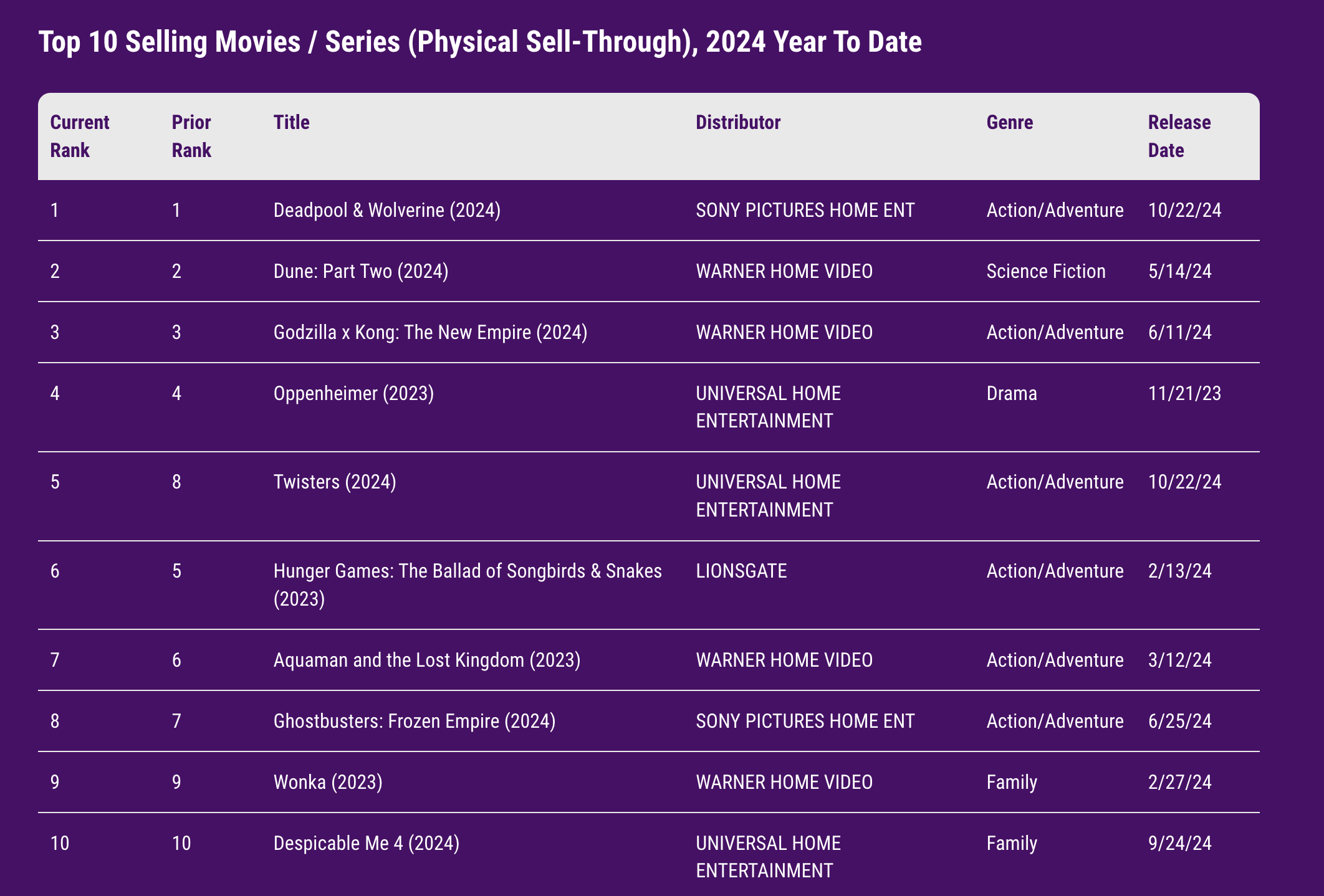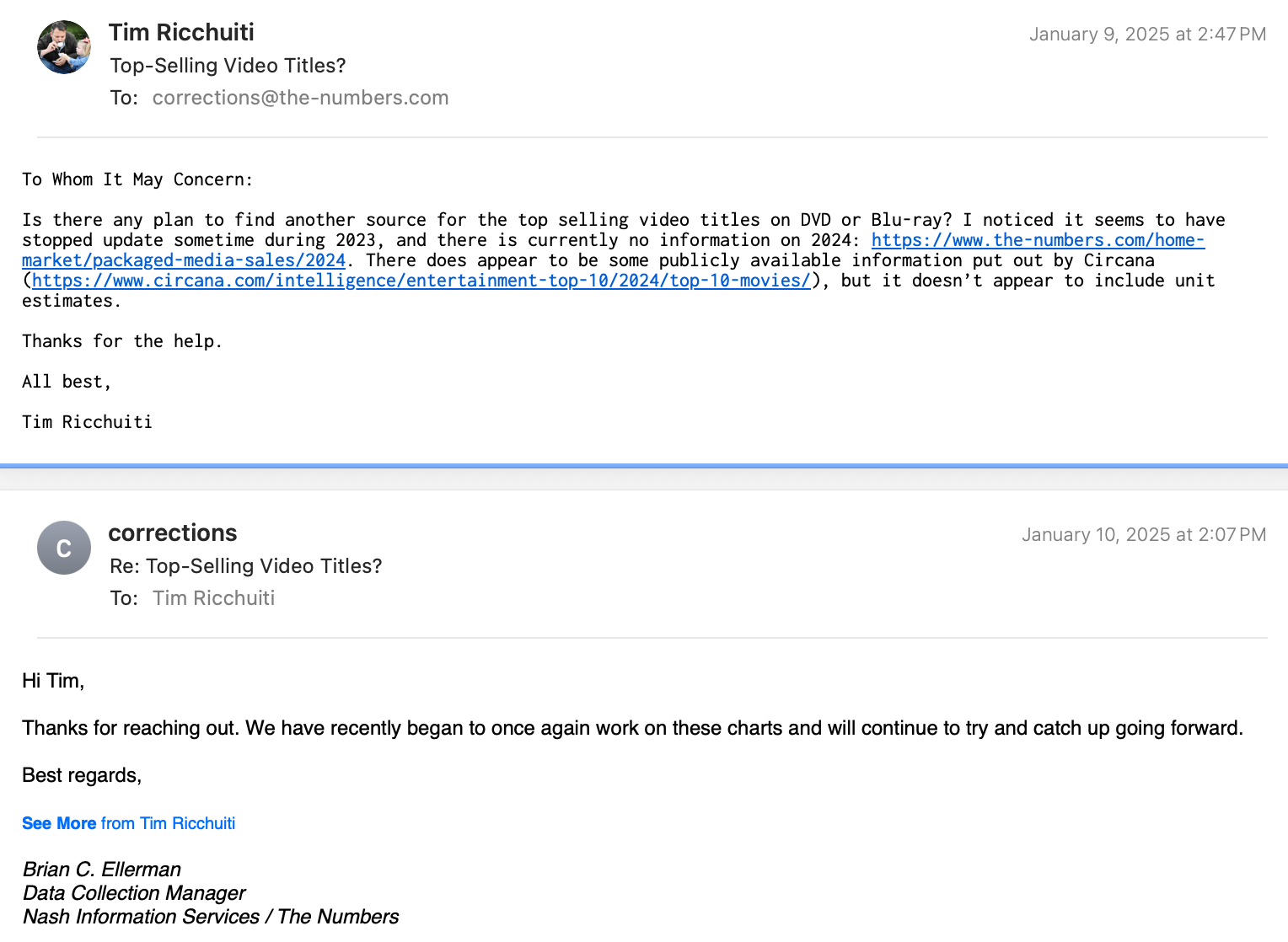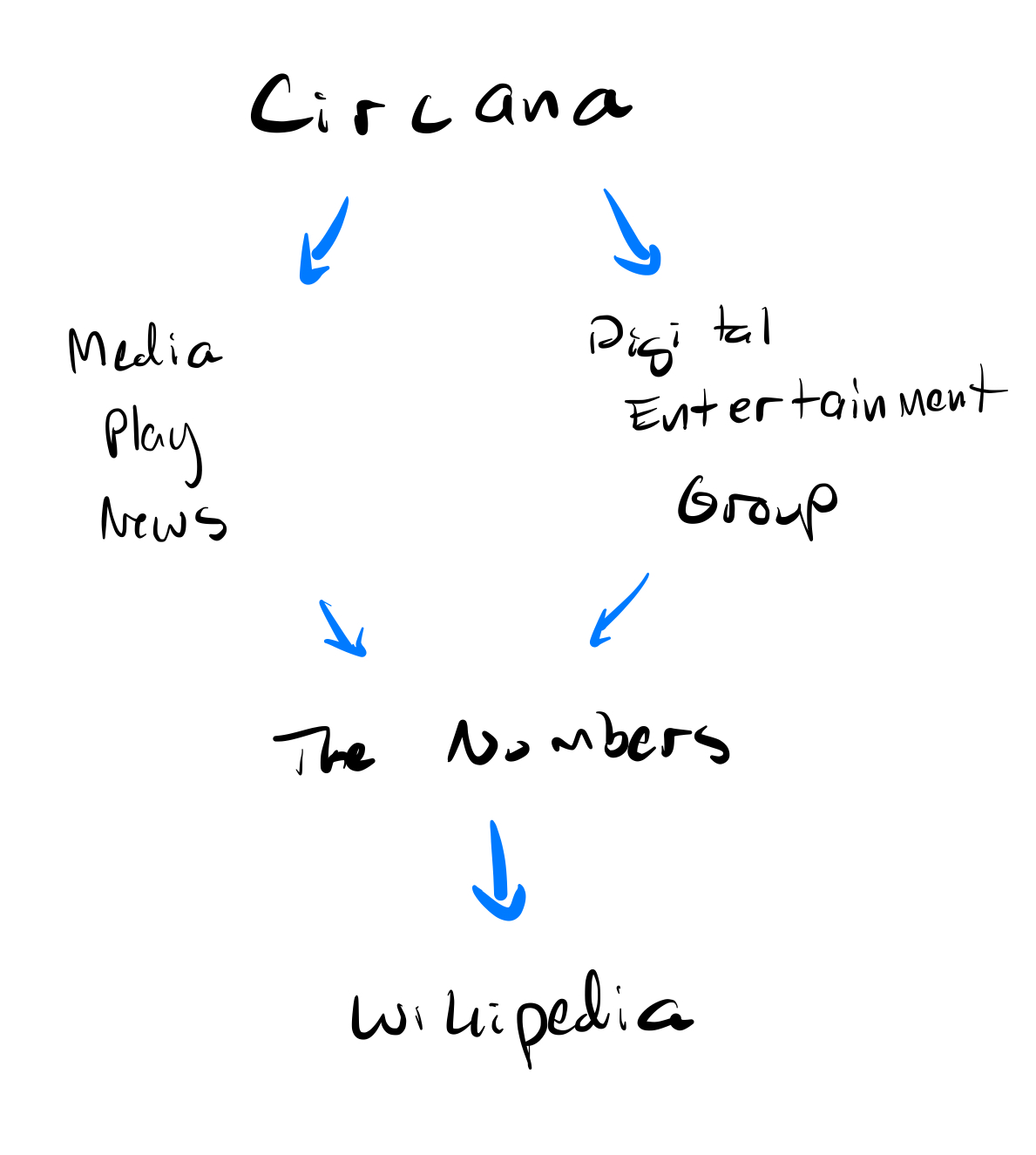
This market is about the best-selling movies sold on physical media (including VHS, DVD and Blu-ray) in the United States, as determined by Wikipedia.
The past years have had some interesting winners:
2023: Black Panther: Wakanda Forever (2022)
2022: Spider-Man: No Way Home (2021)
2021: Wonder Woman 1984 (2020)
2020: Frozen II (2019)
2019: Avengers: Endgame (2019)
2018: Black Panther (2018)
Closes when Wikipedia publishes their 2024 list (2023 list until then) *Potentially disputed data source - read comments.
🏅 Top traders
| # | Trader | Total profit |
|---|---|---|
| 1 | Ṁ3,225 | |
| 2 | Ṁ686 | |
| 3 | Ṁ233 | |
| 4 | Ṁ224 | |
| 5 | Ṁ216 |
People are also trading
@mods resolves to Deadpool and Wolverine https://en.m.wikipedia.org/wiki/List_of_best-selling_films_in_the_United_States#2024
@mods See discussion below for details, but as this is a @mattyb market, I think you're going to have to make the call. TLDR; Wikipedia is unlikely to update their 2024 list, and the best source for the resolution of this market is Circana, which has the top selling movie of 2024 as Deadpool and Wolverine.

---
As best as I can tell, the idea is that this market was originally meant to resolve with Wikipedia's updated list of the best selling films in the United States (physical media). However, there was a problem in that Wikipedia has sourced its lists over the years from The Numbers, and The Numbers stopped updating its physical media rankings sometime in 2023. You can see their 2024 list here, and it's empty. I've reached out to them (see email below), and they say they are hoping to resume updates in the future, but there's no current timeline for when that will happen.

There are some suggestions in the discussions below about other possible sources for resolution, including the sources that The Numbers itself says that they use, namely reports from Media Play News and Digital Entertainment Group. However, both Media Play News and DEG get their information from Circana. So I've drawn up this helpful flow chart of the situation.

All of which to say, Circana says that Deadpool and Wolverine was the top disc seller for 2024, and it's not hard to find other reports confirming the same information (e.g., Media Play News 2024 Top-Selling Titles on Disc, or this Media Play News write-up of the same information). So, I think this market ought to be resolved for Deadpool and Wolverine.
@polymathematic Mattyb is off the site, but the description is fairly clear that Wikipedia would be the preferred source & there doesn't seem to be obvious reason to doubt that Wikipedia list so I resolved to D+W
https://www.insidekino.de/BO/Global2024.htm
Doubt that 2 days change much. (Should resolve later since wikipedia is resolution source)
@Willi those are box office numbers. This market is about physical media sales (like DVDs and whatnot). As of November, looks like Deadpool was #1. https://www.mediaplaynews.com/deadpool-and-wolverine-dominated-october-disc-sales-jumps-to-top-of-year-to-date-chart/
@Tumbles What the fuck is going on in here, why are people predicting Openheimer will follow a six year streak of family movies
@mattyb If you look back it's been a family movie ever since 1997, with the exception of the Dark Knight. And the Dark Knight is still a superhero movie
@Tumbles this makes sense - I think families are more likely to buy movies because kids like to watch things over and over again.
@Tumbles Good point, I wasn't fully thinking this through.
@mattyb I think you should reconsider the source for resolving this answer, as Wikipedia and their source, https://www.the-numbers.com/home-market/packaged-media-sales/2023, are currently showing incomplete data, as evidenced by the large drop in total sales from 2022 to 2023.
This doesn't have numbers, but shows Super Mario Bros. at the top of physical media sales in 2023, and might be a better source if Wikipedia doesn't find a better one:
https://www.mediaplaynews.com/research/2023-top-selling-titles-on-disc/
One reason to switch, if there isn't an update, is because there might end up being no data from their source: https://www.the-numbers.com/home-market/packaged-media-sales/2024
@houstonEuler why are MediaPlayNews necessarily more reputable than TheNumbers? They don’t cite their raw numbers anywhere (that I could see on mobile). What’s their data source?
@mattyb I'm not saying they are. Just that if you click on any of movies for the top 2023 list on TheNumbers (https://www.the-numbers.com/home-market/packaged-media-sales/2023), you can see they stopped updating their data on May 28th, 2023.
At the bottom of the page, they list their source as degonline.org, whose current website (https://www.degonline.org/portfolio_page/top-blu-ray-dvd-sellers/) only lists the top selling titles for the week.
If you use the waybackmachine for degonline, there are some archived pages, one of which (https://web.archive.org/web/20230804041634/https://www.degonline.org/portfolio_page/top-blu-ray-dvd-sellers/) shows Super Mario Bros. being the top DVD/Blu-Ray seller for the week ended 7-22-23.
If you go back to TheNumbers list, you'll see Super Mario Bros. isn't even on the 2023 list, because their data cut off before it was released to DVD.
It's clear that TheNumbers is listing incomplete data for 2023, I just suggested MediaPlayNews because it was the only other source I found that seemed like it could be showing accurate data.
@houstonEuler Arrrhhh I’m conflicted about what to do here. Wikipedia (sourcing from The-Numbers) disagrees with Media Play News [MPN] (see 2022’s #5 or 2021’s winner!!).
The-Numbers uses MPN but only for their estimates, so we’d be going with less precise data (which has been wrong before). But as you point out, the higher quality data DEG, seems to only be doing weekly.
Do we go with the worse data? Do I need to aggregate this shit myself (we already missed a few weeks, but I guess wayback machine?)
@mattyb Oddly, I think they both get their data from the same source, Circana Videoscan (https://www.circana.com/intelligence/entertainment-top-10/2024/top-10-movies/).
TheNumbers/degonline were multiply the index figures with reported total sales, to get weekly estimates.
Not sure exactly what you should do here other than hope the answer will be obvious at the end of the year.
@houstonEuler @traders it’s worth reading through this thread and letting us know if you have thoughts. I’ll have this in the description.
@mattyb - Even if MPN numbers are more "accurate", the market description specifically stated Wikipedia as the resolution source. I'm of the opinion that, while it could be considered unfortunate that Wikipedia was chosen as base truth, switching to MPN would fundamentally alter the market.
@LukasDay I really like this, as Wikipedia itself will need to reconcile the ambiguity, and do the hard part for us. Whatever stays on Wikipedia will be our canonical source of truth.
@mattyb @LukasDay The problem is that Wikipedia isn't a source, it's just copy/pasting numbers from another website that has broken.
We've identified the unbroken source of information for that, and other websites reporting this data, which is the actual source of truth for this information.
I understand that the market description initially stated Wikipedia would be the resolution source, but would it have been if you'd known about these discrepancies at the time? It's still very early, as this market resolves in 11 months, and I think it's more unfair to ask a question and accept a CLEARLY incorrect answer, than it is to fix the source of your resolution criteria.
That's because as it currently stands, I could edit the Wikipedia page to say whatever I want (Oppenheimer) at the end of the year, to make the most profit on this market, because the person currently monitoring the page obviously isn't paying attention.
I can't however change the data reported by Circana.
Think about it this way. Let's say you ask a question "What time will it be when I resolve this question?" and point to a clock that you don't realize is broken as the resolution criteria. When you realize the clock is broken, do you point to a different clock that works, or just wait for someone to fix the clock, not knowing if or when that will happen?
From Wikipedia:
"Wikipedia employs no systematic mechanism for fact-checking or accuracy. Thus, Wikipedia articles (and Wikipedia mirrors) in themselves are not reliable sources for any purpose (except as sources on themselves per WP:SELFSOURCE)."
https://en.wikipedia.org/wiki/Wikipedia:Reliable_sources#:~:text=Primary%2C%20secondary%2C%20and%20tertiary%20sources,-Main%20page%3A%20Wikipedia&text=Reputable%20tertiary%20sources%2C%20such%20as,for%20fact%2Dchecking%20or%20accuracy.
@Tumbles Wikipedia can be both a source and a conduit of information. In some cases, editors write and summarize complex information from multiple sources, to create an article.
In other cases, Wikipedia just relays information from other sources.
This is a situation where it's clearly operating as a conduit, rather than a true source of information.
@houstonEuler A website that relays information from other sources is a source. An 'information conduit' as you put it is a source. You seem to be conflating "source" with "primary source"
@Tumbles You're arguing semantics. I'm using source in the sense that it's an originator of information, you're using it in the sense that it's a provider.
Yes, it's technically a tertiary source, and one that is clearly not trustable, as they've relayed incorrect information.
@houstonEuler - the accuracy of the source is irrelevant to the market. The market description states that the resolution of the market is based off Wikipedia.
To use your prior example "What time will it be when I resolve this market?", the clock used to resolve the market is critical. If the market description says that the market will resolve based on Clock A and Clock A is broken, you can't just switch the market to resolve off Clock B because a market that resolves off Clock B is a fundamentally different market from the one that resolves off Clock A. The market resolving off Clock A already has the information that Clock A is broken built into the trades.
You're trying to argue that the market should resolve to the most accurate data available, but the market isn't trying to resolve using the most accurate data available, it's trying to resolve using Wikipedia and that's perfectly OK.
If you feel that a more accurate data source would make for a better market, you are encouraged to start your own market (I know I've done that before). Competition is what drives capitalism.
@LukasDay No, trust in markets is what drives capitalism. If markets break, you fix them to avoid a collapse, because people don't want to trade in untrustworthy markets.
I see three ways this could go:
The market incorrectly resolves "Other", because the source for the Wikipedia page is broken.
The market resolves incorrectly, because someone manipulates the Wikipedia page for their personal profit.
The Wikipedia page will get fixed, and it won't matter.
The reason I think we should switch to a primary source is because it would eliminate #1 and #2, which are adverse resolutions to this market.
@houstonEuler - Fundamentally changing resolution criteria (the thing you're insisting the market creator do) breaks trust in markets. If, at the end of 2024 the best selling movie listed by Wikipedia was not one of the options offered on the market, then the market absolutely would be functioning properly if it resolves OTHER because the best selling movie wasn't one of the listed options.
What is the best selling movie of 2024? (Resolved by Wikipedia) and What is the best selling movie of 2024? (Resolved by MPN) are two different markets.
@houstonEuler - if the market simply had the headline with no description we wouldn't even be having this discussion because the market resolution was amorphous. But because the market originally stated that it was based on Wikipedia and all trades on this market have been made with that knowledge, switching to MPN at this point in time is blatant market manipulation.
@LukasDay I edited an earlier comment to show three ways this market could go. Changing the criteria is in the interest of preserving the market and protecting it from manipulation, because it's currently broken.
There's no reason to trade, because the resolution criteria is currently in limbo, and that makes it subject to even greater manipulation. These questions need to be considered:
If Wikipedia is kept as the source, on what day will this market resolve?
If someone updates the Wikipedia page to benefit themselves on January 1st, 2025 will this market resolve to whatever they choose as the resolved answer even if it's provably wrong?
Would it then be market manipulation for the creator of this question to reject their updates to the page?
@houstonEuler - Point 1 is based on the premise that "Wikipedia as a source is broken". I've already stated that the idea that source can be "broken" is irrelevant to the discussion because a market that is based on a "broken" source is still a valid market. It is an almost certainty that at the end of 2024, possibly the first month of 2025, the will be a Wikipedia page titled "Best-selling movies of 2024" and the market will resolve based on that. You can argue whether the numbers on the page are objectively accurate, but the market isn't based on objective accuracy. It's based on the numbers that appear on Wikipedia. The market is clear and unambiguous in this regard. Yes, even if it can be proven that the number that appears on Wikipedia is objectively wrong. That doesn't matter. The market states "as determined by Wikipedia". Point 2 is really grasping at straws. Quite frankly, if someone goes through all the trouble of infiltrating the Wikipedia movie page editing clique just so they can sabotage the Best-Selling movies of 2024 page in order to snag some non-fungible monopoly money on a prediction site that checks notes currently has a dashboard dedicated to betting on peoples' love lives, they freaking deserve it. Perspective. This isn't PredictIt. But to your point, even if some were that...ambitious then yes, in my mind that is still a valid resolution because that was the number that appeared on Wikipedia. That's not a bug, that's a feature. The market isn't untrustworthy, the resolution criteria is clearly stated and unambiguous, and the only thing broken is your understanding of prediction markets.
I've spoken my opinion. I leave it to the market creator to decide however they think is best to resolve the market.
PS. "When does this market close?" It closes 15 Jan 2025. Click the three dots at the top of the market. Shows you all sorts of useful info.
@LukasDay @houstonEuler thanks for some great discussion! I’m inclined to leave the market as is, and have Wikipedia provide a canonical source for their information for 2024 as opposed to us shifting - as there’s no clear ideal alternative that we can all agree is the most accurate and conclusive.
I agree that there will likely quickly be information added to Wikipedia at the end of 2024, and I’m hopeful that it’ll have a good source, which we can take as factual (be it MPN’s estimates or an other).
Wikipedia has some fairly strictly rubrics for additions (from what I’ve previously seen) and I expect that to remove any blatant misinformation fairly quickly, the Jan 15th close was to allow for this ambiguity and some news trading.
@LukasDay You're using some really twisted logic to try and justify yourself. I don't think you're comprehending my arguments, because you're attacking the wrong parts. Hopefully Wikipedia will get fixed, and this will all be moot.
P.S. The closing date and time is separate from when it's resolved. Here are the FAQs if you'd like to learn more: https://docs.manifold.markets/faq#what-is-a-prediction-market
@mattyb I don't see how how you can expect them to "remove any blatant misinformation fairly quickly" when they are still displaying clearly wrong information a month into the year.
@houstonEuler i do empathize with this argument, and Wikipedia shouldn’t be wrong. I’ve opened a discussion on the page about this subject.